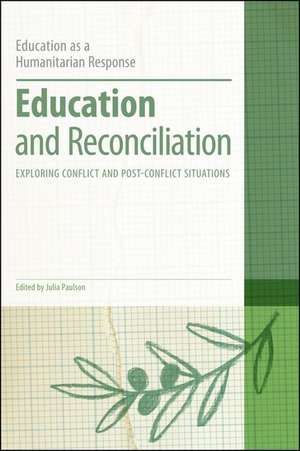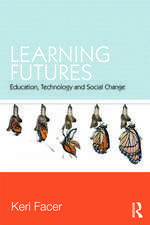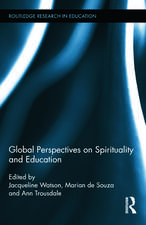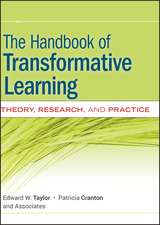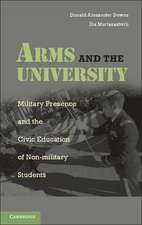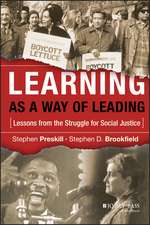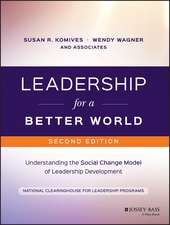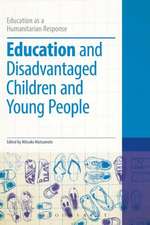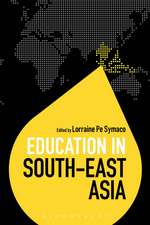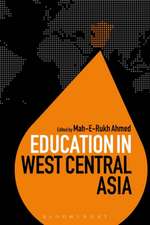Education and Reconciliation: Exploring Conflict and Post-Conflict Situations: Education as a Humanitarian Response
Editat de Julia Paulson Dr Colin Brocken Limba Engleză Paperback – 30 mar 2011
What is the relationship between education and reconciliation initiatives? Who encourages and enacts it and who discourages and detracts from it? Do reconciliatory educational practices offer any insight into the nature of reconciliation as a process?
Drawing on international research in numerous countries, including Bosnia Herzegovina, Rwanda, South Africa, Jordan, Peru and the USA, the contributors consider, conceptually and empirically, the role of education in reconciling societies, groups and individuals divided by conflict. These case studies expand conceptual and empirical understandings of the understudied relationship between education and reconciliation and its potential for addressing and repairing the divisions of conflict. Each chapter contains a summary of the key points and issues within the chapter to enable easy navigation, key relevant and contemporary questions to encourage you to actively engage with the material and an annotated list of suggested further reading to support you to take your exploration further.| Toate formatele și edițiile | Preț | Express |
|---|---|---|
| Paperback (1) | 304.55 lei 6-8 săpt. | |
| Bloomsbury Publishing – 30 mar 2011 | 304.55 lei 6-8 săpt. | |
| Hardback (1) | 1064.91 lei 6-8 săpt. | |
| Bloomsbury Publishing – 30 mar 2011 | 1064.91 lei 6-8 săpt. |
Preț: 304.55 lei
Preț vechi: 332.84 lei
-8% Nou
Puncte Express: 457
Preț estimativ în valută:
58.28€ • 61.28$ • 48.15£
58.28€ • 61.28$ • 48.15£
Carte tipărită la comandă
Livrare economică 17 aprilie-01 mai
Preluare comenzi: 021 569.72.76
Specificații
ISBN-13: 9781441153258
ISBN-10: 144115325X
Pagini: 208
Ilustrații: 10
Dimensiuni: 156 x 234 x 18 mm
Greutate: 0.34 kg
Editura: Bloomsbury Publishing
Colecția Continuum
Seria Education as a Humanitarian Response
Locul publicării:London, United Kingdom
ISBN-10: 144115325X
Pagini: 208
Ilustrații: 10
Dimensiuni: 156 x 234 x 18 mm
Greutate: 0.34 kg
Editura: Bloomsbury Publishing
Colecția Continuum
Seria Education as a Humanitarian Response
Locul publicării:London, United Kingdom
Descriere
What is the relationship between education and reconciliation initiatives? Who encourages and enacts it and who discourages and detracts from it? This book explores the role education has played in fostering or hindering reconciliation between groups divided by violent and/or social conflict.
Caracteristici
Uses international case studies to explore the relationship between education and reconciliation in different contexts.
Notă biografică
Julia Paulson is a Doctoral Researcher at the University of Oxford, UK, and Chair of the Conflict and Education Research Group (CERG).
Cuprins
Series Editor's Preface Colin Brock \ Introduction: Education and Reconciliation Julia Paulson \ 1. Young People and Conflict: The Implications for Education Jason Hart \ 2. Reconciliation through Relationships among Teachers and Sub-Saharan African Families in the USA Sarah Dryden-Peterson \ 3. Education and Reconciliation in Northern Ireland Alan Smith \ 4. Understanding Responses to Postwar Education Reform in the Multiethnic District of Brcko, Bosnia-Herzegovina Briony Jones \ 5. Beyond Reconciliation? Designing a Democratic Citizenship in Post Apartheid South Africa David Johnson \ 6. Reconciliation Through Educational Reform? Recommendations and Realities in Peru Julia Paulson \ 7. A Unified Rwanda? Ethnicity, History and Reconciliation in the Ingando Peace and Solidarity Camp James Kearney \ Conclusion: Assumptions and Realities Julia Paulson \ Index
Recenzii
'In Education and Reconciliation, Julia Paulson has assembled an impressive array of new and established voices to explore some of the most pressing themes in the study of conflict societies: how should we define and pursue 'reconciliation'; what impact does violence have on children, either as victims, perpetrators, bystanders or the next generation left to deal with the legacies of conflict; and how can education permit a direct confrontation with the trauma of the past while safeguarding against future harm. Combining theoretical precision and in-depth analyses of case studies, this book is essential reading for anyone interested in the role that pedagogy and historical narratives play in fomenting, redressing and preventing conflict.' Phil Clark, Lecturer in Comparative and International Politics, School of Oriental and African Studies, University of London, UK, and convener of Oxford Transitional Justice Research
'The strength of this collection of papers extends its importance far beyond educational research circles. Paulson and colleagues lays out a cogent case that reconciliation is built on much ambiguity and many assumptions that ultimately come to hamper, even exacerbate, smouldering conflict situations around the World. It is rare to find insight from educational research that so powerfully resonates in so many other conflict-related arena.' Jeremy Rappleye, Reader in Comparative Education, University of Tokyo, Japan
'A must-read for those working in the area of international education development. Paulson brings together a superb group of varied authors to help us gain better insights into the realities of post-conflict reconciliation practices and the (un)intended effects of these in diverse contexts worldwide.' Janet Shriberg, Assistant Professor of Professional Psychology, University of Denver, USA
'The strength of this collection of papers extends its importance far beyond educational research circles. Paulson and colleagues lays out a cogent case that reconciliation is built on much ambiguity and many assumptions that ultimately come to hamper, even exacerbate, smouldering conflict situations around the World. It is rare to find insight from educational research that so powerfully resonates in so many other conflict-related arena.' Jeremy Rappleye, Reader in Comparative Education, University of Tokyo, Japan
'A must-read for those working in the area of international education development. Paulson brings together a superb group of varied authors to help us gain better insights into the realities of post-conflict reconciliation practices and the (un)intended effects of these in diverse contexts worldwide.' Janet Shriberg, Assistant Professor of Professional Psychology, University of Denver, USA
